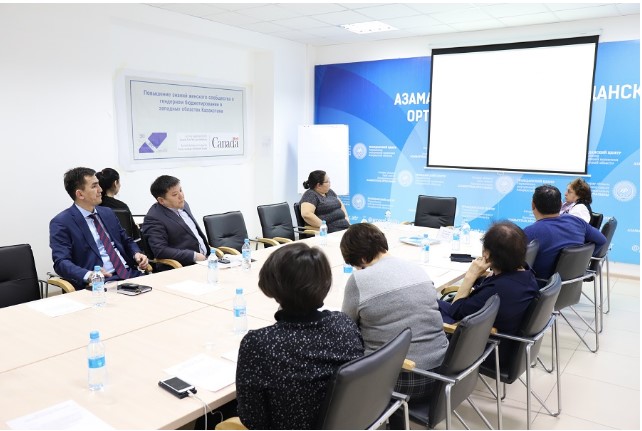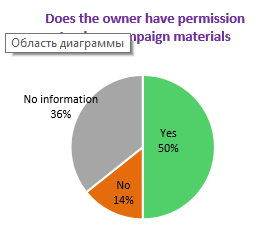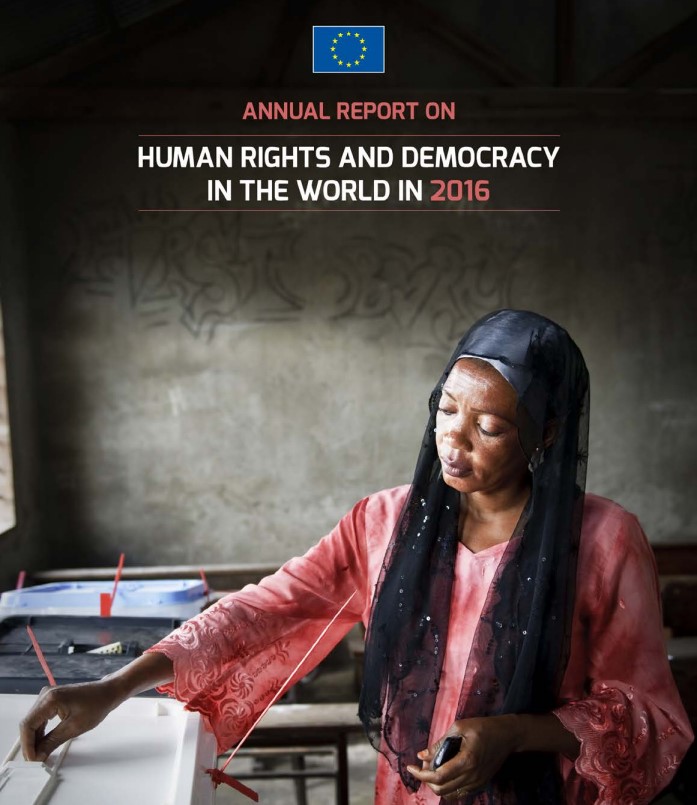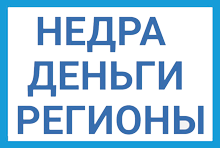Round table in the framework of the project "Improving the knowledge of the female community on gender budgeting in the western regions of Kazakhstan"
Round tables were held in Atyrau on February 25 and in Aktobe on February 27 within the framework of the project “Improving the knowledge of the female community on gender budgeting in the western regions of Kazakhstan” with the assistance of the Canada Fund for Local Initiatives. (The organizers were partners of the Echo NGO Galina Chernova (Center for the Environmental and Legal Initiative Globus Atyrau), Gulzhan Tulemisova (Public Association Shamshyrak Aktobe)
Representatives of civil organizations voiced the problems of local women, which must be solved with the help of state bodies and to attract extractive companies. The most pressing issue is the lack of kindergartens, secondary schools equipped with toilets, access to water, assistance to single mothers and large families, the need to conduct training courses for women. Civil activists expressed the view that there has long been a need to draw up a local budget with a gender perspective, namely to take into account the needs of women. Participants developed recommendations for akimats and extractive companies.

Improving Women's Knowledge on Gender Budgeting in the Western Regions of Kazakhstan
On January 13-14 in Atyrau and January 16-17 in Aktobe, the NGO Echo held training and group consultations as part of the project “Improving Women's Knowledge on Gender Budgeting in the Western Regions of Kazakhstan” with the assistance of the Canada Fund for Local Initiatives.
The training included the following topics:
- Budget and gender-oriented budget
- Transparency of extractive industries
- Social and infrastructure projects of subsoil users.
- Gender approach in the EITI. The impact of extractive companies on women.
- Examples of gender approaches in negotiations between extractive companies and the local community.
- Identification of gender issues of local communities.
- Ways of public participation in the formation of the gender budget. Budget cycle.
- Gender Initiatives
- Sources of information.
- Gender statistics
It should be noted that most participants have never heard of gender budgeting, the Extractive Industries Transparency Initiative, and the ability to use the budget and the EITI as a tool to improve the lives of local women and the local community as a whole. Participants received information on gender budgeting and gender initiatives, on the implementation of a gender approach in the implementation of the EITI.
The second day of the training was devoted to discussing the problems of women specific to the region and developing a strategy for solving problems. Most of those present at the training are concerned about the problem of finding jobs for women with many children and single mothers, the lack of training courses for women, and the provision of clean water. It was discussed how to draw the attention of the state, which allocates funds for the development of small business, to the problems of these target groups, and what mining companies can do to solve this problem. Everyone agreed that it is necessary to attract NGOs, civic activists, government bodies and mining companies for multilateral discussion and joint development of recommendations on changes in the budget and the use of social and infrastructure investments to improve the lives of local women.
Among the participants were not only women, but also men who supported the idea of gender equality, representatives of various public organizations, representatives of the akimat, and youth. The presence of representatives of different age groups allowed a broader look at existing problems and develop different solutions. Many participants first learned about the Extractive Industries Transparency Initiative and how to use it in the interests of the local population. This was very important information for them, since the EITI is a real tool for involving civil society, and, in addition, the EITI is starting to introduce a gender approach in the implementation of the initiative.

Presidential election in Kazakhstan 2019. Voting day.
Statement on the Presidential election RK 2019. Voting day.
Assessment of the situation of lesbian, bisexual and queer women in Kazakhstan
NGO Echo administrated project «Assessment of the situation of lesbian, bisexual and queer women in Kazakhstan». Project activity carried out by Feminita.
This project was aimed at developing an evidence-based and cooperative program of empowerment and protection of rights of lesbian, bisexual and queer women. That was be done by employing a two-step approach, where first a comprehensive research was conducted throughout the whole country, allowing to get a ‘portrait’ of different communities of lesbian, bisexual and queer women in Kazakhstan and identifying their social, legal, economic and political needs.
Central Asia and Afghanistan Women and Water Association
NGO Echo administrates activity of Central Asia and Afghanistan Women and Water Association.
A regional workshop entitled “Empowerment of Women in Sustainable Management of Water Resources in Central Asia and Afghanistan” that was held in Almaty, Kazakhstan, 16-18 June, 2016. It provided an excellent opportunity to engage and empower women from the region and allowed for regional network building. At this meeting, more than 40 participants from Afghanistan, Kazakhstan, Kyrgyzstan, Tajikistan, Turkmenistan, Uzbekistan, Romania, Germany, Italy, and the United States participated representing their countries, research institutes, or international organizations. The main purpose was to engage and create a new network of women scientists, engineers, managers, and policy makers in the discussion and decision making process of critical issues regarding improved scientific understanding of the resource, promotion of open data policy, increasing access to water, and enhancing job opportunities with increased responsibilities of women in the region in order to improve inter-governmental and transboundary collaboration. The meeting was a tremendous success with suggestions for future actions.
At the conclusion of this 2016 workshop, participants expressed their interest in continuing efforts to establish an association to work on gender issues in water resource management in Central Asia and Afghanistan. In particular, they requested to engage more women professionals working in the water management sector in the network, create information platforms to exchange and facilitate learning and career development, develop a regional organization addressing common gender issues in the sector, as well as partner with ongoing global and regional programs such as those by the UNESCO WWAP, WfWP, USGS, and the German-Kazakh University. .Local professional women carried out activities and created a regional Central Asia and Afghanistan Women and Water Association (CAAWWA) that includes representation from all Central Asian countries including Turkmenistan and Afghanistan. The official launch of CAAWWA occurred in July 12-13, 2017. At that meeting selected leaders from Central Asia and Afghanistan adopted a mission statement, created and adopted bylaws, and established a Steering Committee (SC) for the organization. They also welcomed the creation of an International Advisory Committee. The meeting represented a transfer of initiative and decision making from USGS, SEF, and U.S. State Department to local women water professionals representing their countries in the region. After the strategy meeting in July 2017, the SC carried out significant work to create the network and further the development of the organization through projects and outreach activities in the region.
CAAWWA mission statement:
“Enhancing opportunities of women in scientific, technical and political aspects in water resources management and climate change issues, building up capacity, improving their career development and engage them in decision making processes to strengthen international cooperation.”
The association is governed by an elected six-person Steering Committee. A secretariat implements SC decisions and carries out day-to-day functions. The SC adopted an action plan consistent with the outcomes of the June 2016 workshop on the empowerment of women in water resource management in Central Asia and Afghanistan
Source of information https://caawwa.org/?page_id=967

EU Annual Report on Human Rights And Democracy in the World in 2016
- Also available: ru-RU Русский
On Monday 16 October 2017 the Council adopted the EU Annual Report on Human Rights And Democracy in the World in 2016.
Extracts from the report on the situation in Kazakhstan















